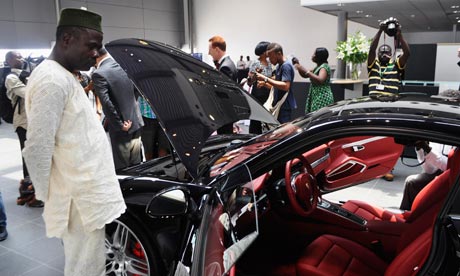Nigeria’s wealthiest businessmen, whose fortunes grew exponentially in the past decade, have lost billions of dollars in paper value as a result of plunging stock prices and the rapid depreciation of the naira.
Such volatility is a perennial hazard for the super-rich in Africa’s largest economy, which has diversified greatly during the past decade — as banks and other services have boomed — but which is still underpinned largely by one number: the price of oil.
Aliko Dangote, Africa’s richest man whose cement, sugar and flour milling companies make up a quarter of market capitalisation on the Lagos stock market, has been the biggest loser, with $5.4bn wiped off his estimated $21bn personal fortune in the past year, according to Bloomberg data.
Most of these losses have been incurred since November, when the tumbling price of oil — on which the state depends for about 70 per cent of revenues — exposed the failure of President Goodluck Jonathan’s government to put away sufficient savings and prompted a rush to the exit by foreign portfolio investors.
The naira has lost about 20 per cent of its value in the past six months, a decline exacerbated by political uncertainty ahead of Nigeria’s forthcoming elections. For early-stage companies with local currency income but foreign currency debt, the strain is showing.
“A lot of people’s dreams have been killed because they are using naira-based income to fund dollar-denominated debt,” Mr Dangote tells the Financial Times from his offices in Lagos.
Around the corner in the same upmarket neighbourhood of Ikoyi, Tony Elumelu, chairman and former chief executive of UBA bank, says he converted a $230m loan towards the acquisition of a power plant into naira last month for just that reason.
He too has seen his paper fortune slashed. Heirs Holdings, his wholly owned investment company with diversified interests in power, banking, agriculture and healthcare, has lost an estimated $445m on its majority shareholding in listed Transcorp, another diversified asset buyout group. Mr Elumelu’s investments in other listed companies such as UBA, have shed nearly $40m.
“It is paper value,” he says nonchalantly, showing no sign of concern. “It you look at the people in this space like Aliko [Dangote] and myself we are not short-term investors. We are not going to take our cash out tomorrow.”
Mr Dangote, who has survived many ups and downs in his 35-year journey from cement haulier to industrial mogul, concedes that he has been losing some sleep. He has $11bn — in bank loans and personal investments — riding on a planned refinery, petrochemicals and fertiliser plant outside Lagos, which could transform Nigeria’s downstream petroleum sector and slash national fuel import bills.
But he remains sanguine about stock prices — once the turbulence surrounding the March 28 elections settles.
“If it is a race I can assure you I will come back stronger,” he says. “We have had a hard time for now, but the fundamentals of the business are there.”
Among other big paper losers is Jim Ovia, chairman and former chief executive of Zenith bank — which wrestles with Mr Elumelu’s UBA for ascendancy. His 9 per cent stake in Zenith has lost more than $100m since January.
Both bankers were among a group of “oligarchs” who joined the super-wealthy in the early part of the century when a blend of raw capitalism and economic nationalism saw the state using various forms of largesse to promote select businesses and industries in Nigeria.
A more recent crew of super-rich have won big on oil trading contracts during Mr Jonathan’s tenure, or by acquiring marginal, onshore oil blocks sold off by the multinationals.
Kola Karim’s Shoreline Energy bought a block with Heritage Oil of the UK. He says he is confronting not only the falling oil price but a battle with oil thieves, who steal 20 per cent of production.
“A lot of people bought assets at the height of the market. If we bought three-and-a-half years ago and we are feeling the pinch, imagine the guy who bought last year,” he says.
Yet the super-rich will barely need to trim their lifestyles, he adds. The cost of maintaining private jets, motor yachts and stables full of polo ponies is less in Nigeria than in the developed world. His worry is for the middle and upper-middle classes.
“The benchmark effect of this downturn is for the guy who understands the value of education and struggled to get his kids to school in England who now cannot afford the extra [hard currency] cost of fees,” he says, adding that the lesson for Nigeria is clear.
“We need to diversify the mega-drivers of the economy — away from oil into gas, into power, into manufacturing and into agriculture.”
He plans to take advantage of a recent rise in domestic gas prices to build pipeline infrastructure and has started a company to farm fish and tomatoes.

